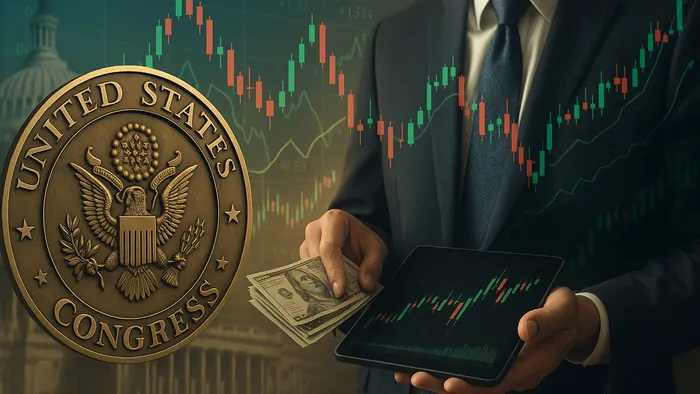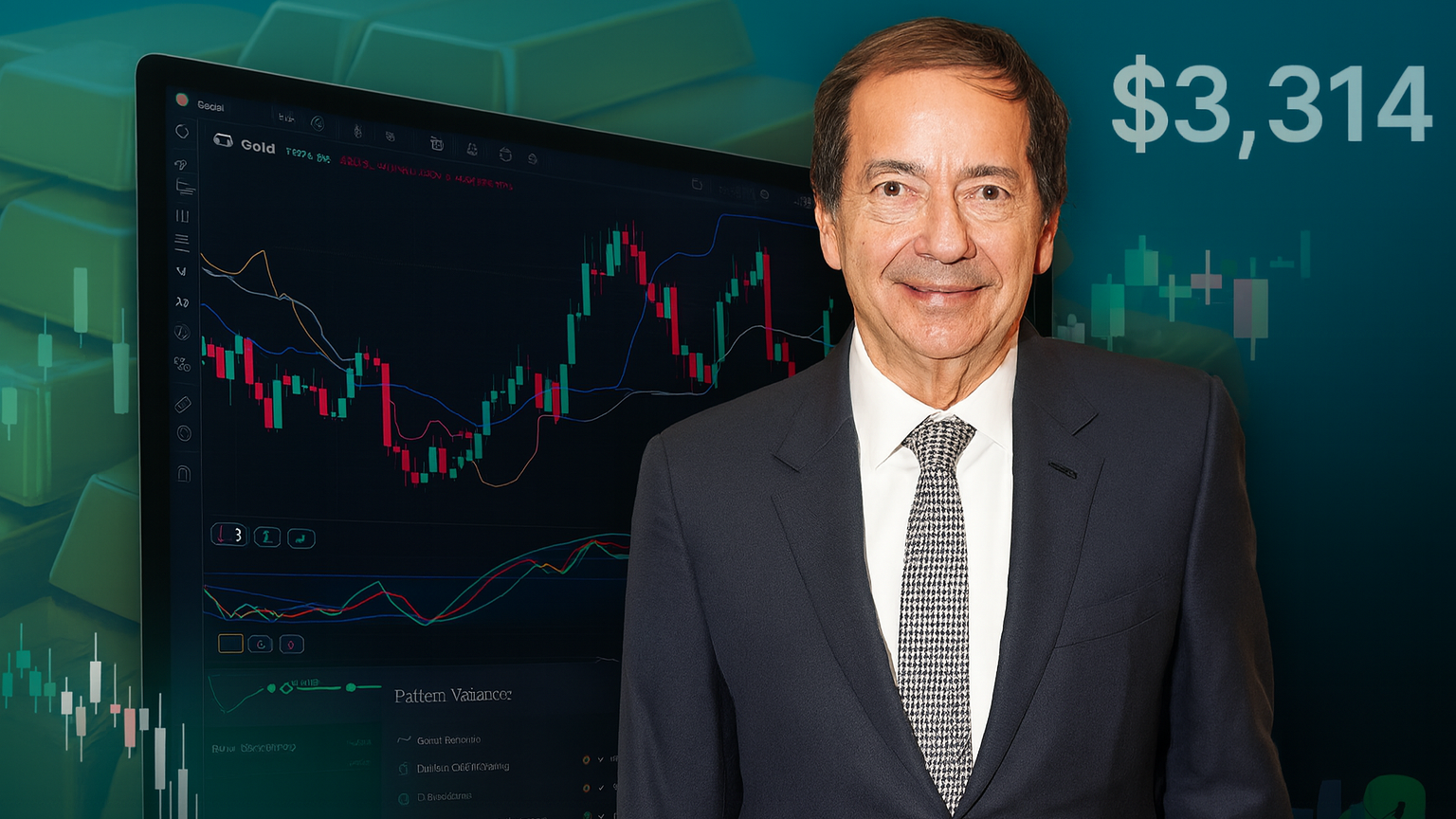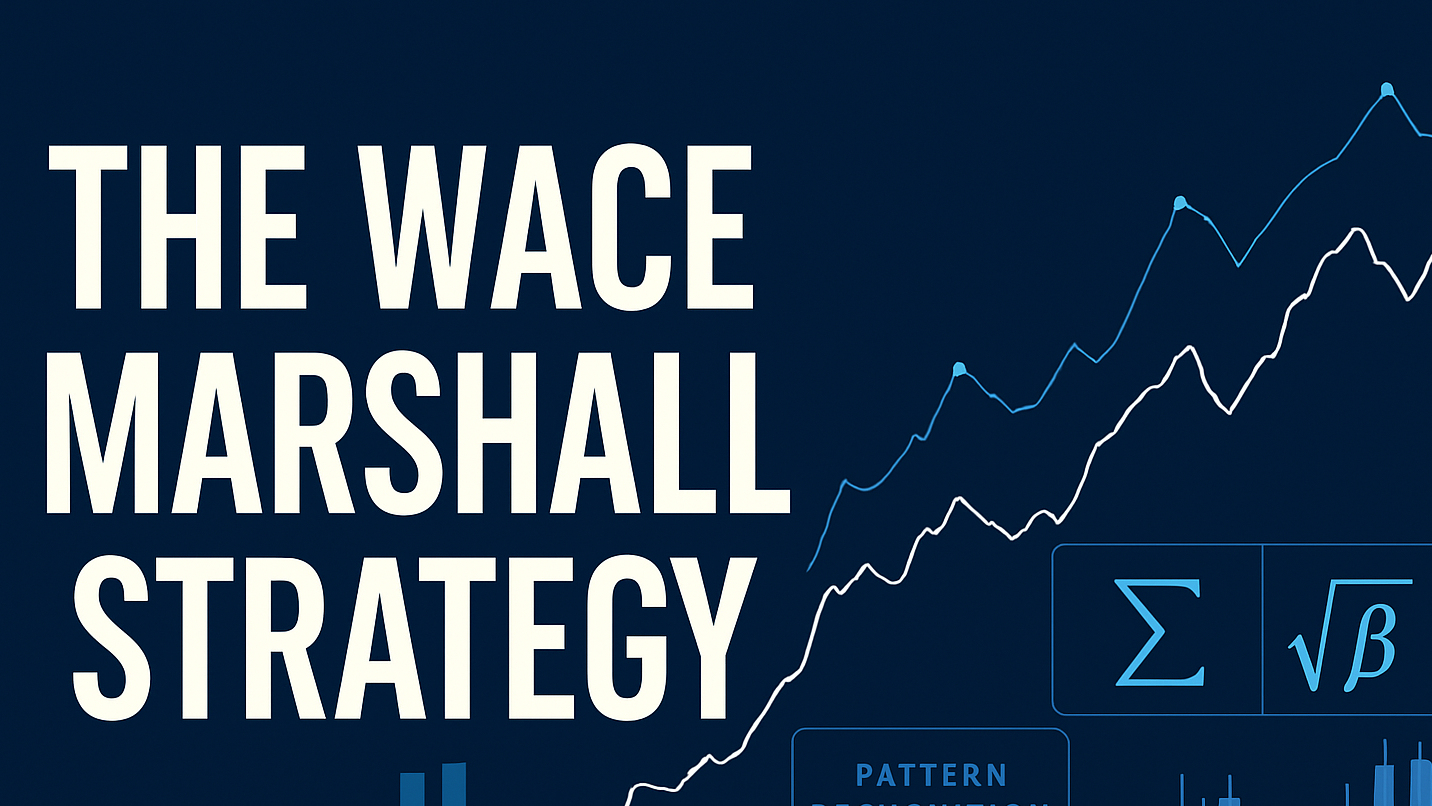Explore the ethical concerns of congressional stock trading, its impact on public trust, and the push for stricter regulations to ensure transparency.
Did you know that members of Congress are required to disclose stock trades over $1,000 within 45 days? Yet enforcement gaps and trading practices have raised ethical concerns and public distrust. Here’s what you need to know:
Data visualizations in this article were cross‑checked against LuxAlgo market‑insight dashboards and the free LuxAlgo Library, which hosts hundreds of indicators across popular charting platforms.
- Congressional Trading Rules: Governed by the STOCK Act (2012) and Ethics in Government Act (EIGA), requiring timely disclosures and annual financial reports.
- Ethical Issues: 44 % of House members and 54 % of Senators own stocks, often tied to industries they regulate.
- Market Impact: Lawmakers' portfolios have outperformed the S&P 500 by 3–5 % annually, sparking questions about insider knowledge.
- High‑Profile Cases: Examples include trades linked to COVID‑19 briefings and legislative actions, like tariff announcements or defense contracts.
- Public Sentiment: 86 % of Americans support banning stock trading by Congress members and their families.
Quick Comparison of Key Data Sources
| Source | Features | Access |
|---|---|---|
| efd.senate.gov | Official disclosures, 30‑day updates | Public, free |
| InsiderFinance | Real‑time analysis, alerts | Subscription‑based |
| OpenSecrets.org | Campaign finance plus trading data | Free, detailed insights |
| SenateTrades | Daily trade summaries | Free, user‑friendly |
If you want to backtest how congressional disclosure headlines might affect market positioning, the LuxAlgo AI Backtesting platform lets you spin up automated strategies in minutes, no code required. New users can follow the quick‑start guide to model hypothetical rule changes such as a two‑day reporting window.
Why it matters: Congressional trading practices can influence market trends and public trust. Understanding the rules and tracking disclosures helps ensure transparency and accountability.
Conflicts of Interest? Congressional Stock Trading Under Scrutiny | Amanpour and Company
Stock‑Trading Laws for Congress
Congressional stock trading is regulated by two primary laws, the STOCK Act of 2012 and the Ethics in Government Act (EIGA). These laws aim to ensure transparency and accountability in financial dealings.
STOCK Act Rules
The STOCK Act makes it clear that members of Congress and their staff are bound by insider‑trading laws. It requires them to electronically report financial transactions within 30–45 days, and these disclosures must be made public within 30 days. By mandating these timely and transparent reports, the law seeks to maintain public trust and confidence in the integrity of the financial markets.
EIGA Requirements
The Ethics in Government Act complements the STOCK Act by mandating detailed annual financial disclosures. These Financial Disclosure Statements, covering the previous year, must be submitted by May 15.
The Act outlines specific categories of financial reporting:
| Category | Reporting Threshold | Requirement |
|---|---|---|
| Earned Income | $200+ per source | Disclose compensation |
| Investment Assets | $1,000+ value or $200+ income | Report stocks, bonds, real estate |
| Securities Transactions | $1,000+ | Detail purchases, sales, exchanges |
| Personal Debt | $10,000+ | Report debts per creditor |
| Gifts | Above $335 aggregate | Disclose non‑relative gifts |
| Travel Expenses | $335+ per source | Report sponsored travel |
EIGA also requires members of Congress to disclose the financial interests of their spouses and dependent children. Additional reporting includes non‑governmental positions, future job arrangements, deferred‑compensation plans, and private‑employer benefit plans. Furthermore, new officers, employees, and candidates must report any compensation exceeding $5,000 received from a single source outside the U.S. government.
Together, these laws create a robust framework for financial transparency and accountability in Congress.
Ethics and Past Cases
The issue of congressional trading has long been a hotbed of controversy, raising concerns about conflicts of interest and practices that undermine public confidence in government. These ethical challenges are brought into sharper focus when examining documented conflicts and notable trading cases.
Conflicts of Interest
Balancing legislative responsibilities with personal financial interests presents a clear ethical dilemma. Currently, 44 % of House members and 54 % of Senators own stocks, creating situations where their decisions in office could directly impact their investments.
"This is a venture opportunity. This is an opportunity to leverage your position in public service and use that position to enrich yourself, your friends, and your family... So it's not illegal, but I think it's highly unethical, I think it's highly offensive, and wrong..."
- Peter Schweizer, William J. Casey research fellow at the Hoover Institution
A revealing analysis found that 130 members of Congress or their families traded stocks worth hundreds of millions of dollars in companies actively lobbying before their committees. Between 2007 and 2010, lawmakers traded stocks valued between $85 million and $218 million across 323 companies registered to lobby on legislation they were overseeing.
Major Trading Cases
The ethical concerns surrounding congressional trading are vividly illustrated by several high‑profile cases, showcasing how legislative activity can intersect with financial decisions.
| Date | Legislator | Transaction | Issue |
|---|---|---|---|
| Feb 2020 | Sen. Richard Burr | $628,000 – $1.7 million sold | 33 transactions after a COVID‑19 briefing |
| Jan 2020 | Sen. Kelly Loeffler | $1.27 – $3.1 million sold | 27 transactions after a Senate briefing |
| Jan 2020 | Sen. John Hoeven | $250,000 purchased | Bought health‑science stocks after a pandemic briefing |
| Apr 2025 | Rep. Jared Moskowitz | $20,000 – $300,000 | Purchased stocks before a tariff‑pause announcement |
The COVID‑19 pandemic in 2020 brought these issues to the forefront. Several lawmakers made trades following private briefings on the virus's potential impact, sparking public outrage and amplifying calls for reform.
"We're here to be public servants. And frankly, I don't care if Democrats did it. I don't care if Republicans did it. We're not here to feed at the trough."
- Rep. Alexandria Ocasio‑Cortez
Public trust in Congress is alarmingly low, with only 20 % of Americans expressing trust in the federal government. Furthermore, 86 % of Americans, across party lines, support banning congressional stock trading.
Other notable examples include Senator Tommy Tuberville's 2024 sale of $50,000 in Intel stock months before the Department of Defense canceled its contract with the company. Similarly, in 2019, Representative John Rose sold nearly $200,000 in Wells Fargo stock shortly before his committee released a critical report that negatively impacted the bank's share price. These cases underscore the urgent need for stricter regulations to restore public confidence.
Where to Track Congress Trades
If you're using congressional trading data to anticipate market trends, knowing where to find reliable information is crucial. Both official government sources and specialized platforms provide access to this data, each offering unique benefits.
Official Data Sources
Congressional trading disclosures are publicly available through government channels. For the House, these documents can be accessed at the Legislative Resource Center (B81 Cannon House Office Building). The Senate offers its data through the electronic filing system (eFD) at efd.senate.gov, which serves as the main hub for Senate transaction reports.
Here’s what you need to know about these reports:
- The reports are made public within 30 days of filing.
- Historical records dating back to 2012 are available at efdsearch.senate.gov.
- Senate reports remain accessible for six years after a senator's term ends, while reports from candidates are kept for one year.
While these official sources are comprehensive, they can be slow to update. That’s where specialized platforms step in to provide faster, more actionable insights.
Data Platforms
Specialized platforms compile and analyze congressional trading data, offering tools that make it easier to interpret and act on the information. Here’s a quick look at some popular options:
| Platform | Key Features |
|---|---|
| InsiderFinance | Real‑time analysis, sector‑specific insights, and custom alerts |
| OpenSecrets.org | Detailed investment tracking and transaction histories |
| SenateTrades | Tracks 73 senators with daily trade summaries |
| GovTrades | Database of senator holdings and historical trade data |
Platforms like LuxAlgo’s cross‑platform Screeners aggregate these disclosures in real time, letting you filter by sector or by individual legislator.
These platforms have uncovered some eye‑opening trends. For instance, a 2023 study found that lawmakers’ portfolios outperformed major market indices by 3–5 % annually.
Features to Look For
When deciding where to track congressional trades, consider these key aspects to ensure you’re getting the most out of the data:
- Reporting Speed – many platforms offer near real‑time updates, often faster than the official 30‑day disclosure window.
- Detailed Insights – premium services provide added value, such as sector breakdowns, customizable alerts, and performance‑tracking tools.
- Access Options – physical copies of reports are available at the Senate Office (144 Hart Senate Office Building), while digital platforms provide more convenient and advanced analysis. Pair these alerts with the Signals & Overlays toolkit to spot momentum shifts sparked by Capitol Hill news.
Trading‑Pattern Analysis
Looking at congressional trading data can uncover trends that might influence market analysis and guide investment decisions. By studying the trading behavior of lawmakers, investors can gain insights into potential market opportunities and shifts in sector trends.
Industry Patterns
Data from 2022 highlights clear sector preferences among lawmakers. Here's how their investments broke down:
- Democrats leaned toward:
- Technology Services
- Electronic Technology
- Finance
- Consumer Services
- Health Technology
- Republicans focused on:
- Technology Services
- Industrial Services
- Finance
- Electronic Technology
In total, trading volume hit a staggering $788 million across more than 12,700 transactions in 2022. Stocks dominated as the most traded asset class, with transactions surpassing $398 million.
Other notable trends included:
- A decline in technology‑stock investments
- Increased interest in energy minerals and consumer durables
- A drop in options trading compared with prior years
- A spike in stock sell‑offs after the bear market began on 14 June
Overlaying institutional levels from the Price Action Concepts toolkit makes it easier to see where congressional trades align with market‑structure shifts.
Market Performance
In 2022, members of Congress managed to outperform the S&P 500, though their returns varied significantly based on party affiliation.
| Party | Average Return | Key Observations |
|---|---|---|
| Senate Republicans | +5.83 % | Strong positions in commodities |
| Senate Democrats | +16.28 % | Heavy focus on the tech sector |
| House Republicans | +0.4 % | Emphasis on oil and commodities |
| House Democrats | ‑2.0 % | Tech‑heavy portfolios underperformed |
Volume and money‑flow confirmation from the Oscillator Matrix can help validate whether these returns were driven by broad accumulation or short‑term speculation.
"War and rumors of war is incredibly profitable and convenient." – Rep. Marjorie Taylor Greene
Timing played a critical role in these outcomes. For instance, stock sell‑offs surged in response to the bear market's arrival in June 2022. This shift coincided with a move toward more conservative investment strategies, as illustrated by:
- A 59 % drop in transaction frequency
- A 61 % reduction in total trading value compared with 2021
- Increased investments in government securities and agency debt
- Greater allocations to mutual funds and ETFs
These patterns suggest that tracking congressional trading activity can provide useful insights into market trends, including sector rotations and risk‑management strategies during volatile periods.
New Trading‑Rules
Proposals to reshape congressional stock trading are gaining traction after a 2022 investigation by The New York Times revealed that 20 % of lawmakers traded stocks tied to their committee work. These initiatives reflect growing frustration with existing loopholes and aim to address long‑standing concerns.
Reform Bills
To tackle transparency and conflicts of interest, several new bills propose stricter rules for congressional trading. One of the most prominent is the Ending Trading and Holdings in Congressional Stocks (ETHICS) Act, which seeks to prohibit members of Congress, their spouses, and dependent children from trading or owning securities and commodities.
Here’s a snapshot of key measures included in these reform proposals:
| Reform Type | Description | Proposed Penalty |
|---|---|---|
| Trading Ban | Full prohibition on trading individual securities | Fine up to $1 million or five years in prison |
| Position Restrictions | Ban on net‑short positions and specific investments | Civil penalty of 10 % plus of the asset value |
| Blind Trust Requirement | Mandated placement of investments in a qualified blind trust |
"Congressional stock trading is deeply corrupt. We are elected to serve the public, not our portfolios. And no member should vote on bills biased by the character of their holdings."
- Sen. Jeff Merkley
Changes to Reporting
Proposed changes also address the STOCK Act's current 45‑day reporting window, reducing it to just two days, aligning with corporate insider requirements. This comes after reports showed that congressional trading outperformed the S&P 500 by 17.5 % in 2022.
If you want to simulate the effect of a two‑day disclosure window on historical data, the Backtesting Assistant quick‑start guide shows how to model that scenario in under five minutes. The Backtesting Assistant overview explains how to automate these what‑if scenarios without code.
Additionally, the penalties for violating disclosure rules would increase significantly. The current $200 fine could be replaced with penalties tied to the value of unreported trades or even equal to a lawmaker's annual salary. These adjustments aim to improve accountability and deter unethical practices.
Public sentiment strongly supports these reforms, with 86 % of Americans backing a ban on stock trading by members of Congress and their families.
"We need to ban members of Congress from trading stock while they are in Congress. The concentration of power undermines unity and trust."
- President Biden
To see how chat‑based agents can translate proposed reforms into executable trading logic, explore the LuxAlgo AI tools overview.
Key Points
Rules Overview
The STOCK Act of 2012 requires members of Congress, their spouses, and dependent children to disclose securities transactions exceeding $1,000 within 45 days.
Here’s a quick breakdown of the key requirements:
| Requirement | Timeline | Applies To |
|---|---|---|
| Transaction Disclosure | Within 45 days | Members, spouses, dependent children |
| Online Publication | Public disclosure | All reportable transactions |
Despite these requirements, compliance has been consistently low. This highlights the importance of dedicated tracking platforms that monitor and report on these disclosures.
Best Data Sources
Specialized platforms play a vital role in ensuring transparency by tracking and analyzing disclosures. Some of the most trusted platforms include:
| Platform | Key Features | Notable Statistics |
|---|---|---|
| CapitolTrades | Media‑verified data, widely referenced | Frequently cited by major financial outlets |
| OpenSecrets | Integration of campaign‑finance data | 7.5 million annual visitors |
| Unusual Whales | Real‑time alerts and tracking | 33 % of trading members outperformed SPY in 2023 |
In 2023, Congress reported more than 10,000 financial transactions. Interestingly, Democrats outperformed Republicans in portfolio returns that year. One example that drew attention occurred in April 2025, when Rep. Marjorie Taylor Greene made investments ranging from $21,000 to $315,000 across 17 companies, including Apple Inc. (AAPL) and Tesla Inc. (TSLA).
For a step‑by‑step walkthrough on installing congressional‑trade‑tracking layouts, visit the Library getting‑started guide. See a full breakdown of the Free, Premium, and Ultimate tiers in the LuxAlgo pricing‑plans documentation.
FAQs
What happens if members of Congress don’t follow the STOCK Act’s disclosure rules?
Members of Congress who don't adhere to the STOCK Act's disclosure rules can be hit with civil penalties of up to $50,000. These fines are imposed for late filings, incomplete disclosures, or failing to report financial transactions as mandated by law.
Beyond the financial consequences, non‑compliance can also tarnish a lawmaker's reputation. Since financial disclosures are public and scrutinized by watchdog organizations and the media, any misstep is likely to draw attention.
What changes do proposed reform bills suggest to address ethical concerns about congressional stock trading?
Proposed Reform Bills: Tackling Ethical Concerns
New reform bills are being introduced to curb ethical issues by limiting or outright banning members of Congress, along with their spouses and dependents, from owning or trading individual stocks. The goal is to minimize conflicts of interest and rebuild public confidence in government decisions.
Some of these proposals push for the mandatory use of blind trusts to manage financial assets, ensuring officials have no direct control or knowledge of their investments. Others suggest updates to existing legislation, such as the Ethics in Government Act and the STOCK Act, to close loopholes and strengthen oversight. A few bills go even further, recommending these restrictions apply to the President, Vice President, and their families, creating a more comprehensive ethical standard across government leadership.
Why do many Americans support banning stock trading by members of Congress and their families?
Many Americans believe members of Congress and their families should be barred from trading stocks. The main concern is conflicts of interest and the risk of insider trading. Lawmakers often have access to sensitive information that could influence markets, giving them a potential edge in trading.
In 2023, a survey found that more than 80 % of Americans, spanning all political affiliations, support a total ban on stock trading for lawmakers. This overwhelming agreement highlights a growing push for more transparency and accountability in government, ensuring decisions are made for the public good, not personal profit.
References
- LuxAlgo Backtester Alerts Documentation
- Signals & Overlays Alerts Docs
- LuxAlgo Homepage
- AI Backtesting Platform
- LuxAlgo Library Overview
- Cross‑Platform Screeners
- LuxAlgo Pricing
- Signals & Overlays Introduction
- Price Action Concepts Introduction
- Oscillator Matrix Introduction
- Backtesting Assistant Quick‑Start
- Backtesting Assistant Overview
- Pricing‑Plans Documentation
- Library Getting‑Started Guide
- LuxAlgo AI Tools Overview








